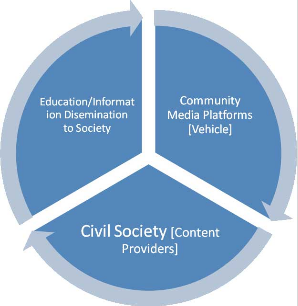HIVAIDS Portal/LearnShare HIVAIDS Africa/Workshop Proceedings/Day1
Contents
LEARNSHARE HIV/AIDS AFRICA WORKSHOP
DAY ONE PROCEEDINGS
26th, April, 2008 – Amarc Africa Pan Africa Community Radio Conference, Abidjan, Cote d’Ivoire
Welcome
The partner organisations were introduced. Brief words of welcome were delivered by representatives by representatives of the partner organisations. Gurmit spoke on behalf of International Aids Society (IAS), Njuki Githethwa on behalf of EcoNews Africa (ENA) and Marcelo for Amarc International and Alymana for Amarc Africa. Commonwealth of Learning (COL) words of welcome were presented by Njuki through slides and a summary of the welcome text from Ian Pringle who could not be able to attend physically.
Objectives
1.2 The objectives of the workshop were presented simultaneously by the two facilitators- Njuki and Gurmit
Introductions
1.3 Participants self introductions: The name tag activity
Participants wrote names on papers and exchanged details of somebody in the room one has not met before. The introduction details were: Name; Country: Organisation; Role and Interests. They were 37 participants in attendance and they all exchanged name tags in the room for about 10 minutes in an activity that was referred to as closing the gap.
Participants
- 5 coordinators of community media networks
- 5 Programme Managers/Officers
- 12 Station Managers
- 5 Producers
- 4 Administrators
- 3 CSO/NGO representatives
- 3 Educationists
These participants form what was referred to as the circle of partnership which link community media, CSO’s and educationists
Circle of Partnerships
Agreement on the day’s programme
9.00 -10.30 – Reflection
10.30 – Coffee/Tea Break
10.45 -13.00 – The Suitcase activity
13.00 -14.00 – Lunch
14.00 – Marketplace
15.30 – Coffee
15.45 -17.30 – Program development
2.0 Reflection 1: Plenary discussions
What do you expect from an effective learning programme?
Principles of effective learning programmes
- Involving the learners through participatory and active methodologies and starting at their level (where they are in terms of knowledge and understanding)
- Interactive
- Problem solving and related to the needs of the individual and the community
- Learning by doing through experiential learning and application
- Understanding that learners can teach by treating with respect and avoiding a patronising attitude
- Sharing knowledge and skills
Reflection 2
What do you expect either as audience or media professional from an effective learning programme on HIV/AIDS treatment literacy using community media?
| |
|
* Effective communication – Simple, explaining jargons
|
* Involvement
|
3.0 Working Groups (WG’s)
Participants formed six working groups. Each working group was comprised of the following:
- HIV Resource person
- Radio Programme Manager
- Radio Programme Staff
- Radio NGO/Association Coordinator
- Development CBO/NGO
3.1 Group Names
- Change
- Baako (Together as one)
- Gong Gong Beaters
- Umoja(Unity)
- Intervention International (II)
- Twaweza (We can)
3.2 Reflection: Suitcase activity
Set of interests, needs and resources: Individuals reflect on their INR’s and then pool them together with others in the working groups
Intervention International
| |
|
|
Collaboration/Networking
|
Website on what we are doing
|
Centres
|
Gong Gong Beaters
| |
|
|
Prevention
|
Training
|
Funding
|
Umoja (Unity)
| |
|
|
VCT combining learning
|
Skills
|
Existing infrastructure
|
Change
| |
|
|
Universal access(prevention and treatment
|
Attract sponsorship and funding
|
Experiences
|
Twaweza (We Can)
| |
|
|
Formats
|
Finances
|
National and sub-regional networks
|
Baako (Together as one)
| |
|
|
Adherence and access to treatment
|
Basic accurate information
|
Financial
|
3.3 Marketplace
a) Four (4) marketplaces
Participants move into the marketplace of selected good practices with a checklist of the principles of effective learning programmes.
Marketplaces
- Gail White (Media Training Centre for Health, South Africa)
- Linda Kasonka (SafAIDS)
- Doreen (Kenya Community Media Network (KCOMNET)
- Cyriaque Ako (Ivory Coast Network of People Living with HIV)
b) Feedback from the marketplace
Good practices checklist
- A partnership among various stakeholders
- Tailor-made for specific audiences
- Integrate the research process in the activity
- Participatory engagement
- Documentation and sharing of documents
4.0: Workshop II: Next Steps
- Programmes development
- Action planning
- Contribution to AMARC manifesto

